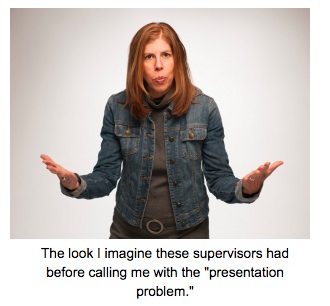
These are calls I’ve gotten recently from clients, concerned about performances of some of their key women.
“She is fine when she’s one-on-one with colleagues, but as soon as she goes into a group meeting or presentation, she clams up. We know she has good communication skills, but she refuses to use them.”
“During the presentation, she didn’t read the room well. She’s done this talk many times and practiced it over and over. Just because a few people were unhappy with the direction, it must have thrown her off because she just kept talking. Someone in the pitch ultimately asked her to sit down in the middle of her unfinished deck.”
“I had a board member look at me and say, “You say they do good work (this internal team made of women), but wow their presentations are horrible. How could that be? – they are a communications team!”
“She has a great communication style and reports that she isn’t nervous, but every time she starts a presentation or even a conversation with a group – she begins to be blush. Her neck turns completely red for at least 15 minutes. How could that be so incongruent with what she’s feeling inside?”
“She answered a question of a board member that should have taken 1 sentence to complete. Instead she took 5 minutes to get it out. She knew the information, what happened?”
Five different industries. Five different situations. Five different women, ages, backgrounds. So what’s the connection?
Each of these calls came from a concerned supervisor. They wanted me to help coach these specific executives into better communication behaviors. You know, be concise. Answer the question asked. Speak up. Be clear. Be compelling. Be engaging.
But each of these executives had communication skills. Sure, we could work on a few improvements. But there was other work that had to be done first.
I’ll call it grounding.
My colleague Suzanne Roberts is the expert at this, and I’ll extrapolate what I’ve learned from her insightful and sustainable somatic coaching.
We each have history and experience that comes with us wherever we are. And if that history and those experiences have not been reconciled – they will rear their ugliness at times of pressure, stress and uncertainty. Like a consequential presentation.
We don’t feel grounded. Or maybe more exactly – we may have consciously convinced ourselves we are grounded – but subconsciously, we really aren’t. And then our “psycho-biology” kicks in. In short, our body works without the advent of self-control from our brain. The closed body stance. The flush neck. Ignoring other’s non-verbals. Over-talking.
So when I was talking to the supervisor of the woman who wouldn’t speak up. I asked a few basic questions because I suspected what Suzanne calls “secondary trauma.” Meaning, she wasn’t personally injured or hurt, but she was around someone who was. Or saw pain and suffering that impacted her. Indeed, her parents were divorced and she had a sister that died in her teens. But more importantly, she had a previous boss who gave her difficult feedback – harsh, rude, negative feedback. Not ever positive or developmental. In those meetings she’s feeling like she has a faultine she’s standing on. So she freezes. It’s safe there (really?). There’s no risk in freezing since you do nothing (your body says). Until your supervisor says your job is on the line if you don’t step up and contribute (yipes!).
Others may flee – avoid the situation. Others defend – talking too much – questioning themselves and their knowledge. And even others may fight back. Take a punch, blame the behavior on someone else. “They didn’t prepare me well for the situation I was about to enter.”
The woman that ignored the feedback? She was trained as a beauty queen as a youth. She didn’t know how to take feedback that wasn’t smiling and clapping, so that’s what she looked for. She ignored all other signs of not doing “perfect.” She had no recovery mechanism.
So as you evaluate, coach and monitor both yourself and your colleagues’ communication inefficiencies, be sure to dig a little deeper at the subconscious triggers that are informing behavior. Because like it or not, we carry all of our experiences with us and it take work to know how to have self-control to keep them from getting in the way of a great presentation.
Articulation Inc will be addressing these issues in concert with Unifying Solutions with a new workshop offering in Fall, 2014. Email ruth (at) articulationinc.com for more information.

